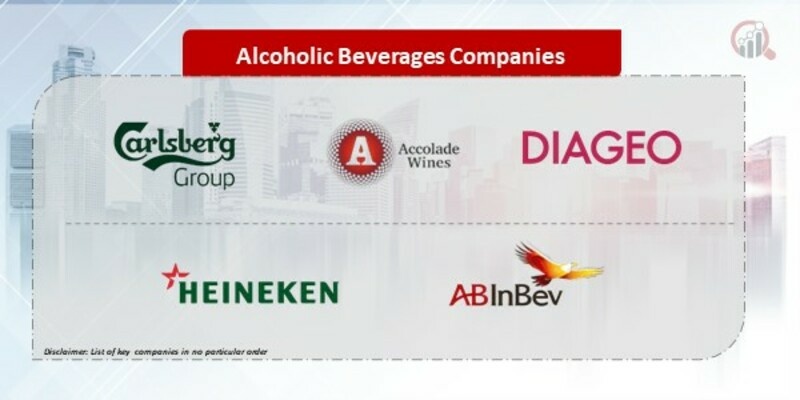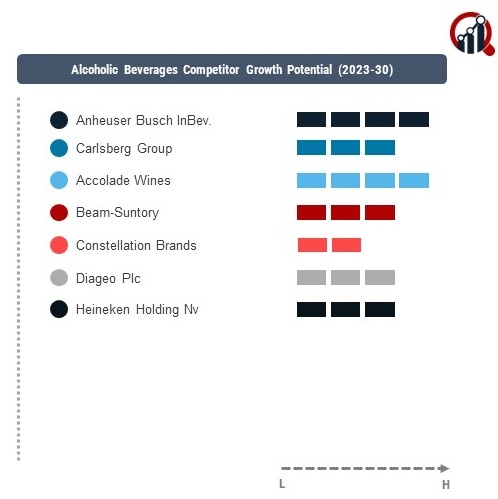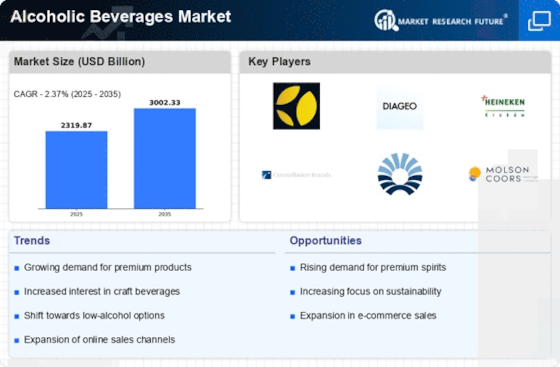Top Industry Leaders in the Alcoholic Beverages Market

The alcoholic beverages market remains a dynamic and ever-evolving sector, shaped by the strategies and activities of key players ranging from global giants to emerging niche brands. The competitive landscape of this market reflects the complex interplay of consumer preferences, regulatory environments, and innovation in the alcoholic beverages segment.
Key Players:
Carlsberg Group
Accolade Wines
Diageo Plc.
Heineken Holding Nv
Beam-Suntory
Constellation Brands
Anheuser Busch InBev.
Strategies Adopted:
The alcoholic beverages market deploy diverse strategies to maintain and enhance their competitive positions. Brand portfolio management is crucial, with companies constantly adjusting and expanding their offerings to align with evolving consumer trends. Market diversification through strategic acquisitions and partnerships is common, enabling players to access new consumer segments and geographic markets. Furthermore, marketing efforts focus on brand image, lifestyle associations, and digital engagement to capture the attention of target demographics and foster brand loyalty.
Market Share Analysis:
The alcoholic beverages segment involves a consideration of various key factors. Brand equity and consumer loyalty play a pivotal role, with consumers often gravitating towards established and trusted brands. Distribution networks and partnerships with retailers significantly contribute to market share, ensuring widespread availability and visibility of alcoholic beverages. Pricing strategies, quality assurance, and responsiveness to regional preferences are essential factors influencing market share dynamics in the competitive alcoholic beverages market.
News & Emerging Companies:
The alcoholic beverages market has seen the emergence of new players capitalizing on the demand for craft and niche products. Start-ups such as CraftSip Brews and BarrelCraft Distillers have entered the market, introducing innovative and artisanal alcoholic beverages. These emerging companies contribute to the diversification of the market, challenging established players and addressing specific consumer preferences for unique and localized offerings.
Industry Trends:
The alcoholic beverages market reflect the evolving landscape of consumer preferences and the emphasis on innovation and sustainability. Key players are actively investing in research and development to create new and unique beverage formulations that align with evolving consumer tastes. Investments in sustainable practices, including eco-friendly packaging and responsible sourcing, are gaining prominence, reflecting the increasing consumer demand for environmentally conscious products. Additionally, companies are exploring digital marketing strategies and e-commerce channels to enhance their market reach and adapt to changing consumer shopping behaviors in the alcoholic beverages segment.
Competitive Scenario:
The alcoholic beverages market is complex and multifaceted, with companies continually adapting to changing consumer preferences, regulatory landscapes, and market dynamics. The battle for consumer attention and shelf space in retail outlets intensifies the competitive landscape, leading companies to differentiate themselves through product innovation, marketing campaigns, and a commitment to sustainability. With an array of beverage choices spanning beer, wine, and spirits, companies strive to maintain relevance and capture market share in an environment where consumer tastes are diverse and continually evolving.
Recent Development
The alcoholic beverages market witnessed significant developments. Diageo plc made headlines with the launch of a premium limited-edition whiskey series, leveraging its expertise in crafting high-end spirits to cater to discerning consumers. Anheuser-Busch InBev announced a strategic partnership with a renowned craft brewery, enhancing its presence in the craft beer segment and responding to the growing demand for unique and locally brewed beers.
Constellation Brands focused on the introduction of low-alcohol and alcohol-free variants of its popular wine and beer brands, tapping into the rising trend of moderation and health-conscious choices among consumers. Pernod Ricard invested in sustainable viticulture practices for its wine portfolio, aligning with the increasing consumer demand for ethically produced alcoholic beverages. Heineken NV expanded its presence in emerging markets through strategic acquisitions of local breweries, aiming to capture the growing demand for international beer brands. These developments underscore the competitive nature of the alcoholic beverages market, with companies actively innovating and adapting to meet evolving consumer expectations and secure their positions in this dynamic and resilient industry.











